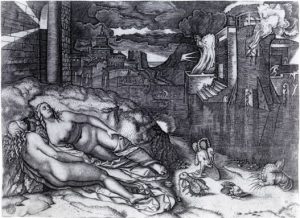 In the early modern era, woodcut and engraved prints operated on multiple levels: as individual creations, and as resources representing preexisting images, objects and spaces. Given the medium’s inherent multiplicity and mobility, prints effectively project visual ideas and concepts, creating mobile models in image and text for dissemination. The medial constitution of print fosters an often undervalued phenomenon of reinterpretation, by channeling traits of artistry and subject matter from the printed medium back into individually produced objects, including paintings, sculptures, and architecture. The workshop engages with the intermediary quality of print and the effective “translation” of information and imagery into situated, singular artefacts.
In the early modern era, woodcut and engraved prints operated on multiple levels: as individual creations, and as resources representing preexisting images, objects and spaces. Given the medium’s inherent multiplicity and mobility, prints effectively project visual ideas and concepts, creating mobile models in image and text for dissemination. The medial constitution of print fosters an often undervalued phenomenon of reinterpretation, by channeling traits of artistry and subject matter from the printed medium back into individually produced objects, including paintings, sculptures, and architecture. The workshop engages with the intermediary quality of print and the effective “translation” of information and imagery into situated, singular artefacts.
From this vantage, several questions arise:
• Can the “message” be disembodied from the “messenger”? In what way does the materiality or appearance of the print condition subsequent replication?
• Do certain compositions, motifs, and iconographies become more stable through print transfer, or potentially more open to adaptation and new meanings?
• What political and cultural power structures emerge through chains of replication, and how do these frameworks impact comprehension of early modern text and imagery?
• Under which conditions were prints perceived as reliable documents or authoritative sources? What potential misunderstandings may have resulted from these “false friends”?
• What happens when different modes of information networks operate in tandem—such as images with text—and what results from joint visual and textual interpretation?
• How do philosophy and media theory discourses regarding copies, reproduction, transmission, and image networks apply to the phenomenon of print as intermediary?
• In what ways can the intersecting discourses of material culture studies and visual histories approach questions of material transfer, disembodiment and re-embodiment?
This workshop considers print culture simultaneously for its materiality, as a conveyor of ideas and information tempered by physical and visual constraints, as well as a conceptual conduit extending between cultures and communities. Presentations for this discussion-oriented workshop may address, but are not limited to the questions listed above. Case studies with a focus on understudied image networks, or new interpretations of well-known replicas are welcome, as are contributions on interdisciplinary and methodological questions or theoretical concepts. This workshop invites scholars to present ongoing research and aims to provide a venue for discussion.
Proposals of maximum 300 words and a brief CV will be accepted until 1 April, 2019 at PrintasIntermediary@gmail.com. Young scholars and PhD candidates are particularly encouraged. We anticipate notifying speakers around 30 April, 2019.
Partial funding of travel costs and accommodation will be provided with the generous support of the Fritz Thyssen Stiftung, in association with the ERC-Funded research project SACRIMA: The Normativity of Sacred Images in Early Modern Europe, Ludwig-Maximilians-Universität München (www.sacrima.eu).
Organizers:
Dr. Erin Giffin (Erin.Giffin@lmu.de)
Dr. Antonia Putzger (Antonia.Putzger@uni-bielefeld.de)
Zentralinstitut für Kunstgeschichte and Ludwig-Maximilians-Universität
Munich, June 28 – 29, 2019
Deadline-CFP: 1 avr. 2019
International workshop supported by the Fritz Thyssen Stiftung

Leave a Reply
You must be logged in to post a comment.